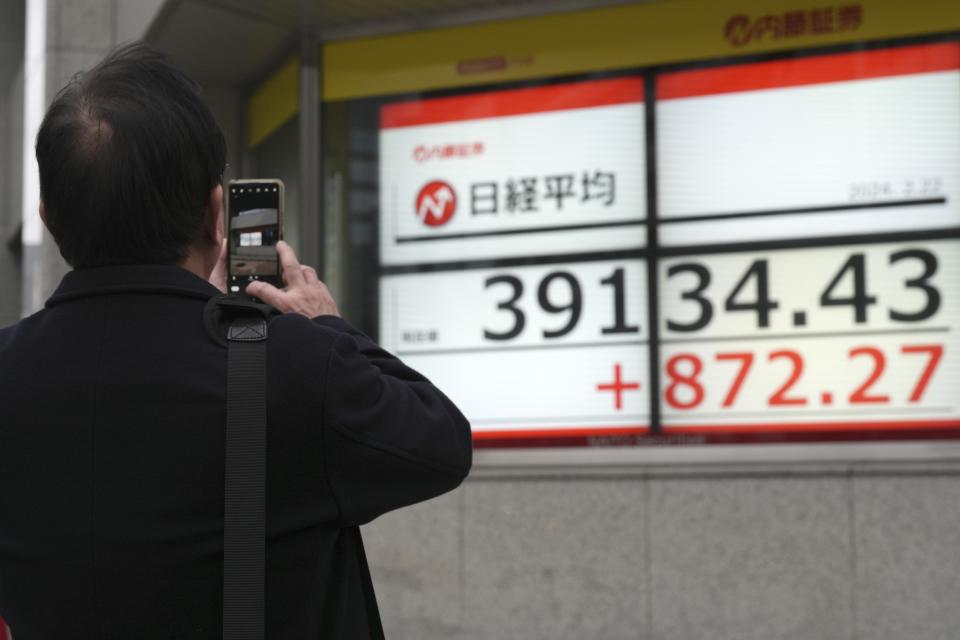
Japan’s benchmark Nikkei 225 index achieved a significant milestone on Thursday by surpassing the record it set in 1989, just before its financial bubble burst, marking the beginning of a period of economic stagnation.
Closing at 39,098.68, the index surged by 2.2% on Thursday. For weeks, it had been hovering near its 34-year highs. The previous record of 38,915.87 was established on December 29, 1989.
This breakthrough signals a potential shift in Japan’s economic landscape and may indicate renewed investor confidence in the country’s market prospects.
The previous record set in 1989 during Japan’s post-war economic boom seems like a distant memory, given the subsequent challenges faced by the country’s economy.
Following the peak, Japanese banks grappled with bad debts amounting to approximately 100 trillion yen, causing share prices to languish well below the record levels for many years. The market experienced a significant dip, plummeting below 8,200 in 2011, exacerbated by the triple disasters of a massive earthquake, tsunamis, and meltdowns at the Fukushima Dai-Ichi nuclear power plant in northeastern Japan.
However, recent months have witnessed a resurgence in the market, marked by sharp gains. Foreign investors, who constitute the majority of trading volume on the Tokyo exchange, have shown strong interest in Japanese stocks, contributing to this upward momentum.
In contrast to the United States, where record-breaking share prices are fueled by expectations of interest rate cuts by the Federal Reserve to combat inflation, Japan has maintained a benchmark interest rate at minus 0.1% for over a decade.
This divergence in monetary policy reflects the unique economic circumstances and policy approaches adopted by the two countries.
News of the economy slipping into recession in late 2023 has prompted expectations that the Bank of Japan will maintain its accommodative monetary policies aimed at stimulating inflation and bolstering growth.
A significant portion of the liquidity injected into the economy by the central bank has flowed into the stock market. Concurrently, many global investors have been reallocating their portfolios away from China amid slowing economic growth and escalating tensions between Washington and Beijing.
In Tokyo, share prices have surged by 15% over the past three months and approximately 44% over the past year. Conversely, Shanghai’s stock prices have experienced a decline of more than 11% from a year ago, while Hong Kong’s Hang Seng index has retreated by about 22%. These divergent trends underscore the shifting dynamics in global markets and investors’ preferences in response to economic conditions and geopolitical developments.
Analysts attribute the increased attractiveness of shares in Japanese companies to record gains in corporate earnings and improvements in corporate governance.
According to Hiromi Yamaji, group CEO of the Japan Exchange Group, Japanese companies are exhibiting signs of transformation, which is capturing investors’ attention. Speaking at an online briefing sponsored by The Financial Times on Wednesday, Yamaji highlighted that while older Japanese individuals may remain hesitant to invest in shares due to the lingering trauma of losing their savings during the early 1990s bubble burst, younger investors are displaying less reluctance.
The growing confidence in Japanese equities is driven by robust corporate earnings and efforts to enhance corporate governance practices, signaling a positive shift in investor sentiment towards Japanese markets.
“The changing landscape: Yamaji highlights a shift in investor behavior as the Nippon Individual Savings Account program undergoes alterations, attracting those seeking greater returns. Analysts note a considerable portion of these funds flowing into foreign markets. Nonetheless, even a fraction of the staggering 1.05 quadrillion yen in Japanese household savings holds significant sway.
Furthermore, the Government Pension Investment Fund, a behemoth among institutional investors globally, has been intensifying its stock investments, contributing to the upward trajectory of prices.”
“Foreign investors, constituting over two-thirds of trading activity in Japan, have surged into the market, capitalizing on opportunities presented by the yen’s depreciation against the U.S. dollar. With the current exchange rate hovering around 150 yen per dollar compared to approximately 140 yen a year ago, foreign investors are drawn to potential bargains in the Japanese market.”
“In January, international investors purchased 125.2 trillion yen worth of Japanese stocks, marking a twofold increase compared to the previous year, as reported by the Tokyo Stock Exchange. Mirroring trends observed in the United States, technology firms such as Renesas, SoftBank, and Tokyo Electron have emerged as notable beneficiaries of this surge in investor interest.”
“Currently, experts assert that Japan’s stock market remains reasonably valued.
The price-to-earnings ratio for the Tokyo market stands at approximately 16, notably lower than the ratios of 23 for the S&P 500, 24 for India’s Sensex, and 8 for Shanghai. In 2023, investors in Tokyo shares enjoyed a robust return of over 28%, as reported by the Nikkei’s website.”
“While Japan’s stock market enjoys stability and growth, a contrasting narrative unfolds in China. Since the devastating meltdown in 2015, Chinese markets have struggled to regain lost ground. The Shanghai Composite index remains depressed, down nearly 10% from a year ago and almost 5% from just three months prior.”
“In the past year, the smaller market in Shenzhen has experienced a significant decline of approximately 25%, while Hong Kong’s Hang Seng index, the world’s fifth-largest exchange, has also dropped by about 20%.
Tensions between Beijing and Washington have cast a chill over both Hong Kong and Chinese mainland markets, prompting companies to exercise caution in their investment decisions. Recent remarks by former President Donald Trump, hinting at potential tariff hikes on Chinese imports to as much as 60% or higher, have further unsettled Chinese markets, contributing to the prevailing sense of gloom.”
